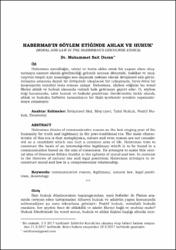Habermas’ın söylem etiğinde ahlak ve hukuk
Künye
Duran, M. S. (2017). Habermas’ın Söylem Etiğinde Ahlak ve Hukuk. İstanbul Hukuk Mecmuası, 75(1), 61-83.Özet
Habermas metafiziğin, tabiat ve hatta aklın ortak bir yaşam alanı oluşturmaya namzet olarak görülmediği gelenek sonrası dönemde, hakikat ve meşruiyetin tespiti için insanlığın son dayanak noktası olarak iletişimsel aklı görür. Anlaşma amacına dayalı bir iletişimde ulaşılacak bir uzlaşmada, birey-ötesi bir meşruiyetin temelini tesis etmeye çalışır. Habermas, söylem etiğinin bu temel fikrini ahlak ve hukuk alanında verimli hale getirmeye gayret eder. O, söylem etiği kuramında, tabii hukuk ve hukuki pozitivizm teorilerinden farklı olarak, ahlak ve hukuku birbirini tamamlayıcı bir ilişki içerisinde yeniden yapılandırmaya çalışmıştır. Habermas thinks of communicative reason as the last staging post of the humanity for truth and legitimacy in the post-traditional era. The main characteristic of this era is that metaphysics, nature and even reason are not considered as a candidate which can buit a common area of life. Habermas tries to construct the basis of an intersubjective legitimacy which is to be found in a communication based on the aim of consensus. He attempts to make this central idea of Discourse Ethics fruitful in the spheres of moral and law. In contrast to the theories of natural law and legal positivism Habermas attempts to reconstruct moral and law in a complementary relationship.

















